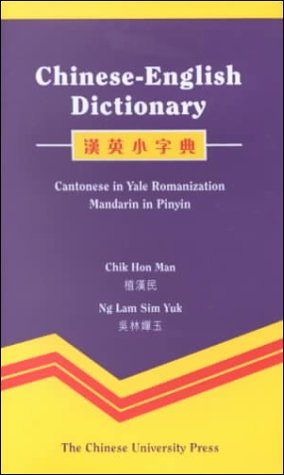|
|
|
|
|
Chinese-English Dictionary (Paperback)
|

|
|
Author/Publisher: Chik Hon Man, Ng Lam Sim Yuk, Chik Hon Man
|
|
Format: paperback |
|
Emphasis: Cantonese, Dictionary |
|
Level: |
|
Note: |
|
List Price: $20
|
|
|
|
Editorial Reviews
Book Description
Chinese-English Dictionary is the first of its kind because it uses
both Cantonese and Mandarin romanizations. It features over 6,000 of the
most commonly used single-characters and over 12,000 terms to illustrate the
use of the characters.
Product Details
- Paperback: 624 pages
- Publisher: The Chinese University Press; 2nd edition (January
15, 2000)
- Language: English
- ISBN: 9622019226
- Product Dimensions: 7.2 x 4.3 x 1.2 inches
- Shipping Weight: 15.0 ounces.
- Average Customer Review:
 based on 5 reviews.
based on 5 reviews.
|
Spotlight Reviews
| 2 of 2 people found the following review
helpful:
 much needed dictionary, July 15, 2002
much needed dictionary, July 15, 2002
| Reviewer: |
esseyo (Jersey City, NJ
United States) |
This is a much needed dictionary for people wanting to learn
Cantonese. It is very useful, well printed, and nicely done. However I
have 2 minor issues: (1) it lacks a Mandarin index so if I know how the
character sounds in Mandarin, I have to resort to tedious radical and/or
stroke lookup to find the Cantonese pronounciation; and (2) the
Cantonese romanization used doesn't explicitly distinguish between a
short 'i' and a long 'i'.
|
Customer Reviews
 Contains errors, April 18, 2005
Contains errors, April 18, 2005
I found a couple of errors in a couple of the definitions and
pronounciations in this dictionary. |
| 2 of 2 people found the following review
helpful:
 Excellent character dictionary, March 31, 2003
Excellent character dictionary, March 31, 2003
This dictionary is excellent for finding individual characters and
their meanings. However, it is not a ready source for finding whole
words (most chinese words consist of 2 or more characters). In other
words, a person could find the characters ¤õ and ¨® and they're
respective meanings, fire and car, quite easily, but ¤õ¨® (train)- is
not listed.
The dictionary's strong points are that it uses Yale romanization for
Cantonese and standard pinyin for Mandarin; that characters can be
looked up in three ways: radical, number of strokes, and Cantonese
romanization; and the detail of its listings.
If it had a Mandarin pinyin index and simplified characther look up
as well it would be a much more useful tool. As it is, it is
indespesible for a Cantonese speaker learning Mandarin and one of the
easiest dictionaries to use to look up a character. I recommend it
highly for intermediate to advanced Cantonese speakers, and I would even
suggest it to students of Mandarin (although not as strongly). |
| 6 of 6 people found the following review
helpful:
 Correction to 1/12/01 review, January 22, 2001
Correction to 1/12/01 review, January 22, 2001
Reviewer: A reader
Oops, to correct a mistake in my previous 1/12/01 review, I meant to say
that the indices only lists traditional characters and traditional
radicals, so you can only look up traditional characters. So if you want
to look up a simplified character, you need to know its traditional form
first. The simplified form, as well as the common traditional variant(s),
is listed in parenthesis after you've found the traditional one. |
| 17 of 17 people found the following review
helpful:
 Great pocket sized E-C dictionary w/ Cantonese pronunciation,
January 12, 2001
Great pocket sized E-C dictionary w/ Cantonese pronunciation,
January 12, 2001
Reviewer: A reader
The only other English-Chinese dictionaries w/ Cantonese pronuncation I
can find are: One from Rita Choy, which is just a 3200 character list
without compounds, another one from Rita Choy which is a beginner's
guide that includes (among other references) compounds for 801
characters, and one from Roy T. Cowles, first written in 1914, which
contains ~5300 characters including a lot of "Cantonese" characters
(ones not found in regular Chinese publications), but requires you to
flip to other page(s) to look up compounds, and I sometimes can't find
modern newspaper characters in it. Please let me know if you know of
other C-E dictionaries w/ Cantonese romanizaton.
This one is more complete, ~6000 char's, and so far, I haven't found
a newspaper/magazine character I wanted to look up that's not in it. It
lists the compounds (usually 2 per char) along with their Yale Cantonese
pronouncation underneath the main char. The pinyin Mandarin
pronounciation is also given for the main char. Char's can be searched
by radical, stroke count, and Cantonese pronouncation. It even has a
plastic coated cover to protect it from wear!
Its main drawback is that it only lists traditional char's, without
the simplified ones used in mainland China. Also, because of the limited
number of compounds, it is best used along side a more comprehensive C-E
dictionary. |
|
|
Admin
|
|
|
Buy from this selected seller
|
|
|
|
